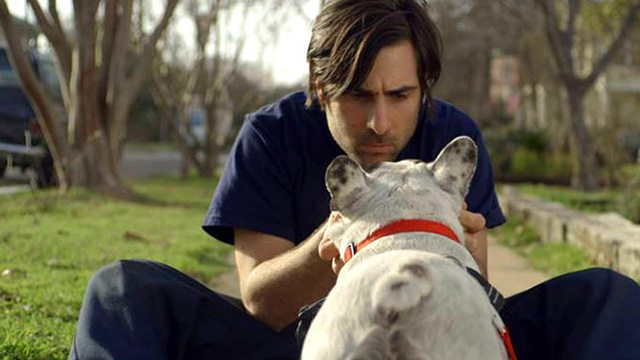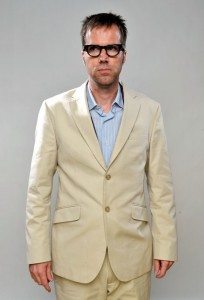
 Director Bob Byington has become a stalwart of the American independent scene, with films like RSO, Harmony and Me, and Somebody Up There Likes Me. His new film, 7 Chinese Brothers, stars Jason Schwartzman and his dog as Larry and Arrow, a pair of slackers struggling through the working world and the death of a beloved grandmother. We talked to the director about working with Schwartzman, finding inspiration for his characters and what he's working on next.
Director Bob Byington has become a stalwart of the American independent scene, with films like RSO, Harmony and Me, and Somebody Up There Likes Me. His new film, 7 Chinese Brothers, stars Jason Schwartzman and his dog as Larry and Arrow, a pair of slackers struggling through the working world and the death of a beloved grandmother. We talked to the director about working with Schwartzman, finding inspiration for his characters and what he's working on next.
Can you start by telling me about your process? Your films seem to be comprised of acutely observed moments rather that traditional plotting and I’m wondering if those are on the page or if you discover them during filming?
It’s both, some on are on the page, some are discovered during filming. You try to create an environment conducive to discovering things if they arise. For example, Jason doing the “fat kid getting out of a pool,” was just something Jason did on set, just him being Jason and we saw that and decided that should be something Larry does and he ends up doing it twice in the film.
How much of Larry was on the page and how much did Jason bring to the character?
Well, he was attracted to the character on the page in the first place, but once he’s there playing Larry, he inhabits the character so fully and really goes to extremes to fit the character.
Your characters often seem inhibited from speaking their emotional state, but will communicate their emotions through highly expressive gestures. Is that a deliberate choice?
No, I don't think it's deliberate. But I try to hire actors that are able to be really expressive in performing actions. Ideally I'd like actors to bring the physicality of a Groucho Marx or a Buster Keaton.
You seem to have an affinity for casting musicians, which the new film continues with Tunde (of TV on the Radio) and Schwartzman as well. What draws you to using musicians?
Well, they’re performative people, they know how to perform and entertain. I have a friend that says, “If you just have actors, it’s not as interesting” and I tend to agree. If there are only actors onscreen, there’s a specific energy that develops and I like to try for something different.
Your films have a very specific tone, is that something you cultivate or just a natural outgrowth of your sensibility?
They… turn out the way they turn out, they are what they are. Some critics have complained about the films being overly “quirky,” or that I’m intentionally making them “tonally weird”, but that’s never what’s happening. I couldn’t make films if I was setting out to make them tonally weird for the sake of it, that’s just how people interpret what I make.
There are several other directors, such as Alex Ross Perry, who appear in cameos in your films, and you’ve played parts in some of their films as well. How has being a part of this community of directors affected your work?
Well, with Alex, he wanted me to play that part in The Color Wheel and then when my new film came along, I really couldn’t imagine anyone else for that part, which is a really important part.
So it’s really just about his talent as an actor?
Absolutely, I think he’s a fantastic actor. And also Jason had just worked with him on a project, so it was easy to call up Alex. That’s a luxury of working with someone like Jason, is that you can just call up someone like Stephen Root and have them in your movie.
Was Jason an element in bringing in Olympia Dukakis? What was it like to work with her?
Yeah, she had worked with Jason on Bored to Death. I don’t think they had any scenes together but they had met. And working with her was great. She’s so funny, with this just withering wit. She’s still so vital at 84 and it’s fun just to hear her stories.

Can you talk about some of the films and directors that have influenced your work?
One big influence is the Finnish director, Aki Kaurismäki. He made these films, the Proletariat trilogy, all movies that were 70 something minutes long, which really sent me in that direction. All of my movies are somewhere in that 70-75 minute range and he helped me realize that I could just tell my stories and I don’t have to work in this 90 minute, three-act paradigm. Another influence is Wong Kar-Wai. With him it was just the tone of his films was something I had never seen. He directs with such a light touch, it’s very inspiring.
It’s interesting to hear you say that, because a light touch is exactly how I would describe your films. The characters in your films often undergo huge life events – the death of a loved one, marriage, etc. – but usually seem more affected by mundane things in their lives.
Well you might be thinking more of Somebody Up There Likes Me. Tonally, the death in 7 Chinese Brothers is very different from the death, or two, or three, in that film. In Somebody Up There Likes Me, you have the deaths framed within a very long amount of time; those deaths affect you less in a 35-year time frame than they do in a time frame of several weeks like in 7 Chinese Brothers.
Your films are very conscious of workplaces and the subcultures within, is that an intentional repetition?
Well, the films are loosely based on my experience, so any job you see is probably a loose reflection of a job I once had, though I haven’t had a job like that in a while now. Jason’s first job is directly based on one I had, not at Buca di Beppo specifically, but a regional chain similar to it. But the Buca di Beppo people were really supportive of the film, surprisingly so since Jason is stealing and drinking while he’s there. But like I said, the films are just loosely based on my experiences. I’m not a registered sex offender, but I had gone through something when I made RSO that made me feel able to relate so I tried to convey that.
How did the story for 7 Chinese Brothers originate?
Well, I had first written something about Larry getting fired a long time ago. I think I wrote a first draft over six days back in May 2001. And that went away for a while, and I went through a lot, including the death of my own grandmother, whom the character in the film is based off. And the story slowly went from total fiction to having some elements of fact. Like I said, indirect links to experience.
How has your style evolved since those early films?
Early on, I worked much faster, I remember we premiered RSO at SXSW and then immediately started shooting Harmony and Me, and I don’t think I even could work that fast anymore, and I don’t want to. Also, we originally took so much flak for low production values, and those have gone up. I think the biggest thing is simply being able to have someone like Jason Schwartzman in the lead instead of a no-name actor. With Jason, audiences have so much trust when they go see one of his movies because of the work he’s done.
Can you tell us anything about your next project?
I’m working on a script called Exile, about a man who gets kicked out of Los Angeles, and that will be with Zach Galifianakis.
7 Chinese Brothers plays on May 30th at Rooftop Films' 2015 Summer Series. For more information and tickets click here.